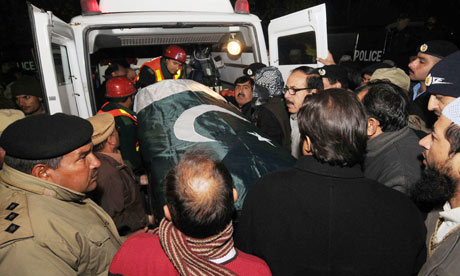Salman Taseer murder throws Pakistan into fresh crisis
by editor | 2011-01-05 10:44 am
![]()
Punjab governor shot by own bodyguard, who opposed reform of Pakistan’s blasphemy laws
Declan Walsh in Islamabad

Pakistan lurched into a fresh crisis after an outspoken secular politician was shot dead by a fanatic who opposed reform of the country’s draconian blasphemy laws.
Punjab’s governor, Salman Taseer, was gunned down by one of his own bodyguards as he stepped from his car in Islamabad’s Kohsar market, a favoured haunt of westerners and wealthy Pakistanis.
The assassin, who belonged to an elite police force tasked with protecting Taseer, shot the governor at least nine times before dropping his weapon and surrendering to colleagues. Officials named him as Mumtaz Qadri.
“A guard jumped out of a car with a flashing light on top of it. He pointed his Kalashnikov at [Taseer’s] window and blasted it,” said one witness.
As he was led away Qadri, a 26-year-old with a curly beard, told photographers he was “proud” to have killed Taseer because he was a “blasphemer”.
Taseer’s death is a blow to Pakistan’s embattled liberal minority and comes at a disastrous moment for the ruling Pakistan Peoples party, which lost its parliamentary majority at the weekend.
As tributes to the slain politician flowed in from across the political spectrum, dazed Pakistanis struggled to come to terms with the death of another political leader, just three years after the assassination of Benazir Bhutto.
“This is a clear and present danger; it shows how deep the problems of Pakistani society are,” said Sherry Rehman, a PPP politician who shared many of Taseer’s convictions. “If we don’t act now, this tide will swallow us whole.”
A sharp and often combative politician, Taseer never shied from a fight and aggressively used Twitter to air his uncompromising views, especially against increasingly powerful extremist forces.
Last month he publicly supported Aasia Bibi, a Christian woman and mother of three who has been sentenced to death for allegedly insulting the prophet Muhammad. Bibi’s case has triggered a fresh debate around the blasphemy laws, which human rights groups say are frequently abused to settle scores or target minorities.
But religious groups staunchly oppose any change, and extremists preachers have offered a reward for the death of Bibi. Meanwhile most politicians, with the exception of Taseer and Rehman, remained quiet on the issue, even within the ruling PPP.
Enraged PPP supporters took to the streets across Pakistan, chanting slogans and weeping. A procession of ashen-faced ministers and officials trailed into the Islamabad hospital where Taseer’s body was taken after the shooting. “These are the forces that are ranged against us,” said Latif Khosa, a former attorney general. “Every time our party comes to power, its leaders are assassinated or disappear.”
Raza Anjum, a young British councillor who recently met Taseer to lobby for Aasia Bibi, said his death was a big blow to “all who are working for an enlightened and progressive Pakistan”.
The attack has strong echoes with the 1984 assassination of Indian premier Indira Gandhi, who was shot by two of her own Sikh bodyguards as she walked to an interview with actor Peter Ustinov.
In recent interviews Taseer acknowledged his life was in danger but apparently did not anticipate a threat from within the ranks of his putative protectors. The interior minister, Rehman Malik, said an investigation conducted by police and the ISI intelligence agency would determine whether Qadri was acting alone or in concert with other extremists.
From a small village outside Islamabad, Qadri was a member of the crack Elite Punjab police unit, whose commandos are known for wearing T-shirts emblazoned with the slogan “No Fear.”
On the internet, Taseer’s death provoked a deluge of shared grief on sites such as Twitter and Facebook. But it also highlighted the number of Pakistanis who celebrated the death as a victory for efforts to defend the blasphemy law. Within hours a Facebook page appeared in support of Qadri; by mid-evening it had over 1,000 followers.
Mohammad Hanif, a leading novelist, said colleagues at the BBC in Karachi had randomly polled people on the street about the shooting. “Everyone approves,” he said on Twitter.
“Religion has become more and more divisive; there is no tolerance,” said Talat Masood, a retired general and commentator. “Our society needs to be completely re-orientated.”
President Asif Ali Zardari declared a three-day period of mourning for Taseer, which may also give him some political breathing room.
The government is fighting for survival since a coalition party, the Muttahida Qaumi Movement, defected to the opposition benches last weekend. Intense backroom talks are under way to bring the MQM back into the fold; otherwise the government could collapse.
Source URL: https://globalrights.info/2011/01/salman-taseer-murder-throws-pakistan-into-fresh-crisis/